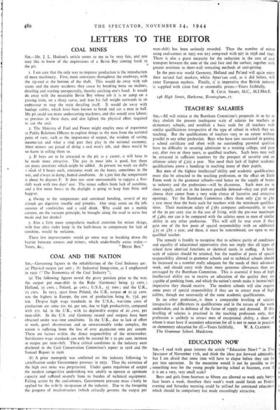TEACHE RS' SALARIES Snt,—All will rejoice at the Burnham Committee's
proposals in so far as they abolish the present inadequate scale of salaries for teachers in elementary schools, and establish a basic scale for all teachers with similar qualifications irrespective of the type of school in which they are teaching. But the qualifications of teachers vary, to an extent without parallel in any other profession. Boys who have just succeeded in gaining a school certificate and often with no outstanding personal qualities have no difficulty in securing admission to a training college, and pass out, after two or three years, as qualified teachers. Such boys may• well be attracted in sufficient numbers by the prospect of security and an ultimate salary of £525 a year. Nor need their lack of higher academic qualifications prove a handicap in teaching many of their pupils.
But men of the highest intellectual' ability and academic qualifications must also be attracted to the teaching profession, or the effect on Sixth Form work in the grammar schools—and hence on the supply of brains to industry and the professions—will be disastrous. Such men are in short supply, and are in the keenest possible demand—they can pick and choose their career from a very wide choice of lucrative and attractive openings. Yet the Burnham Committee cffers them only £30 to £60 a year more than the basic scale for teachers with the minimum qualifica- tions. Their maximum salary of £585 compares unfavourably, in view of the 3o per cent. rise in the cost of living, with the pre-war maximum of £480, nor can it be compared with the salaries open to men of similar ability in any other profession. This will still be true even if they gain one of the few posts of special responsibility with an additional £35 or £85 a year, and these, it must be remembered, are open to any qualified teacher.
The remedy is frankly to recognise that to achieve parity of conditions and equality of educational opportunity does not imply that all types of school have identical functions or identical needs in staffing. A basic scale of salaries should be retained, but the number of posts of special responsibility allotted to grammar schools and to technical schools should be- increased to a number really. adequate for the needs of their advanced work, and should carry with them more generous allowances than are envisaged by the Burnham. Committee. This is essential if boys of high intellectual ability are to receive an education of the quality they are capable of profiting front, and which the nation's needs make it increasingly imperative they should receive. The modern schools will also require some posts of special responsibility if they are to attract men of high calibre, though not necessarily of the same academic qualifications.
In no other profession, is there a comparable levelling of salaries irrespective of differences in qualifications and in the nature of the work undertaken, and in defiance of the factor of supply and demand. If this levelling of salaries is practised in the teaching profession only, that profession is unlikely to attract men of exceptional ability, a share of whom it must have if secondary education for all is not to mean in practice
an elementary education for all.—Yours faithfully, W. A. CLAYDON. The Grammar School, Maidstone.


























 Previous page
Previous page